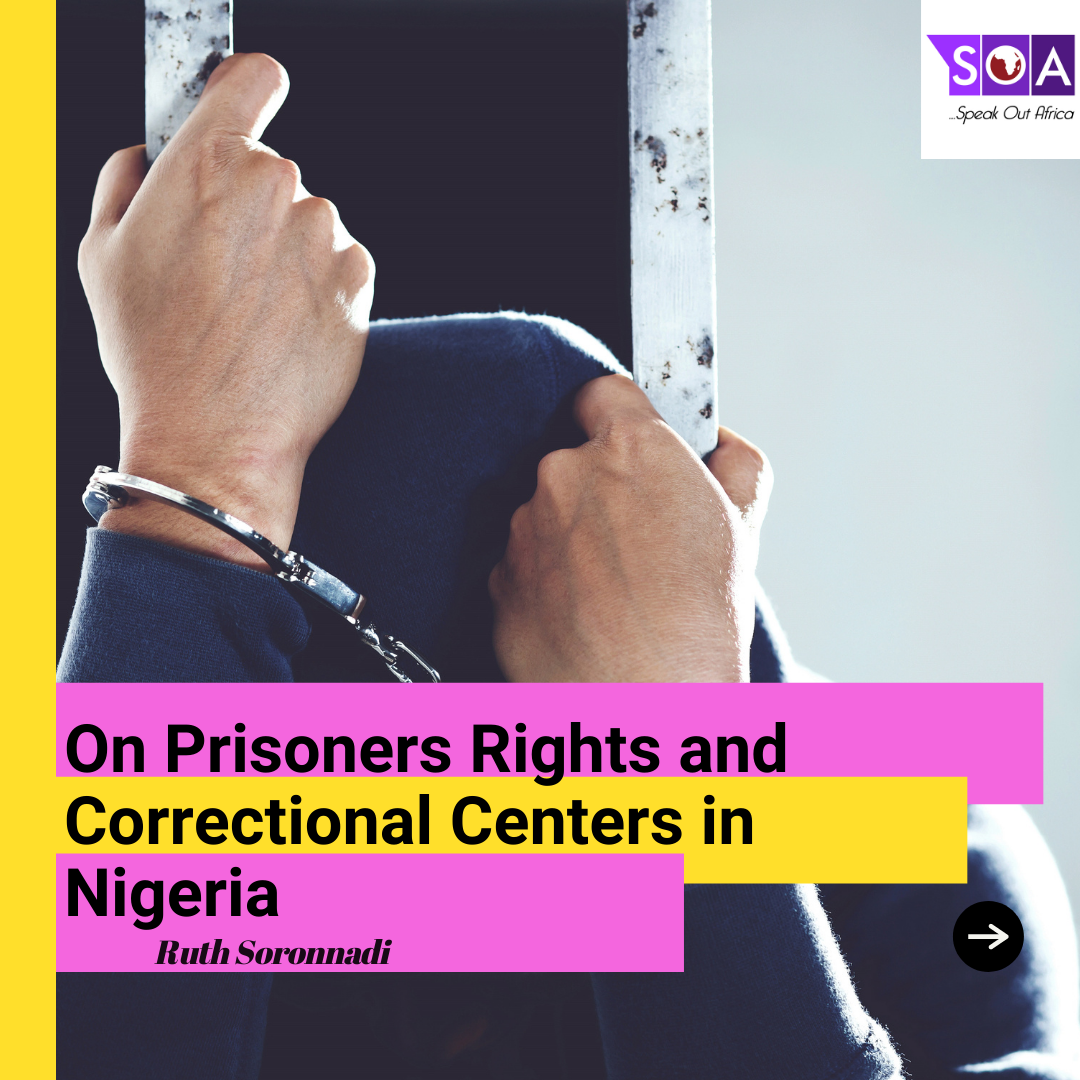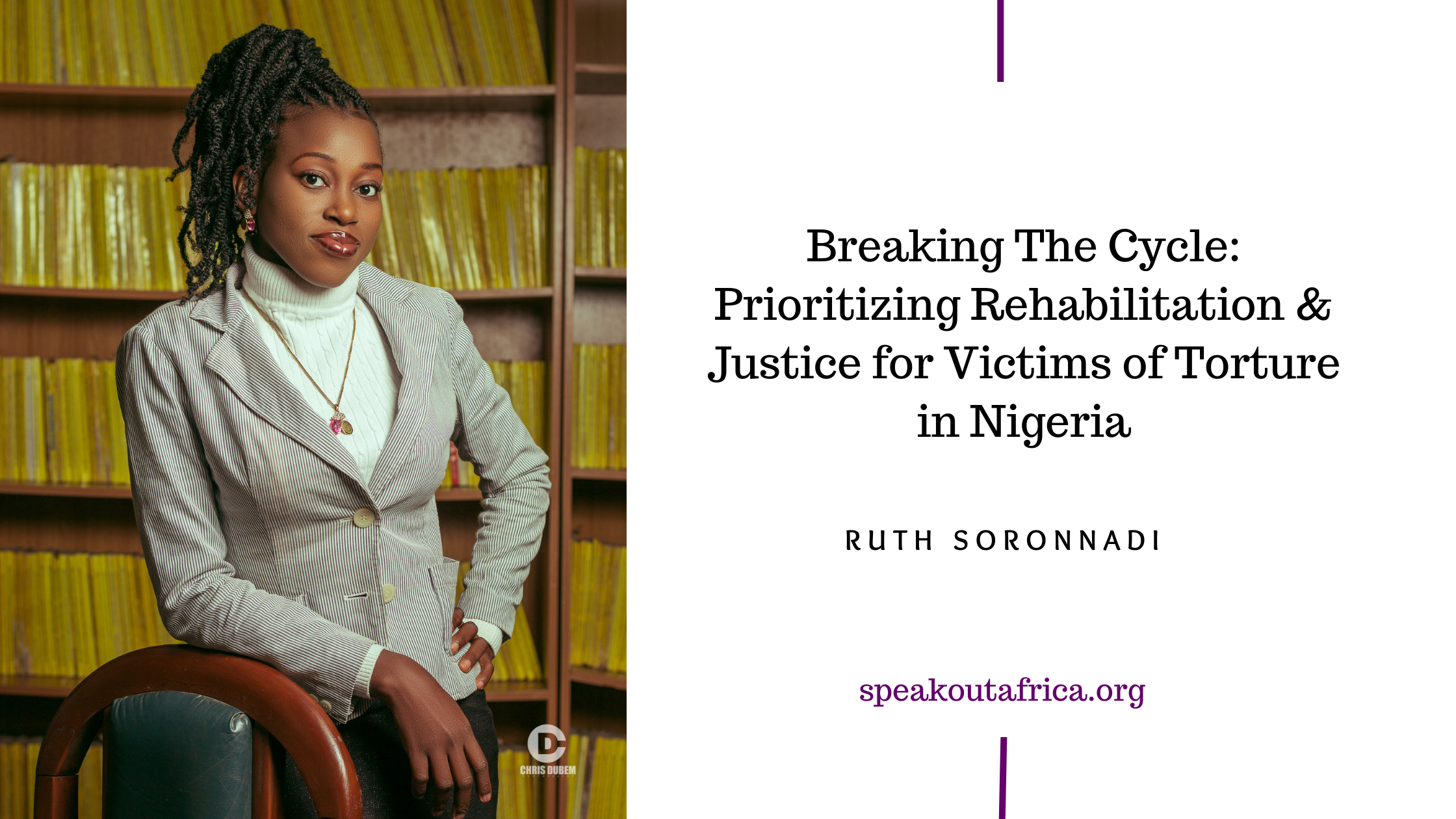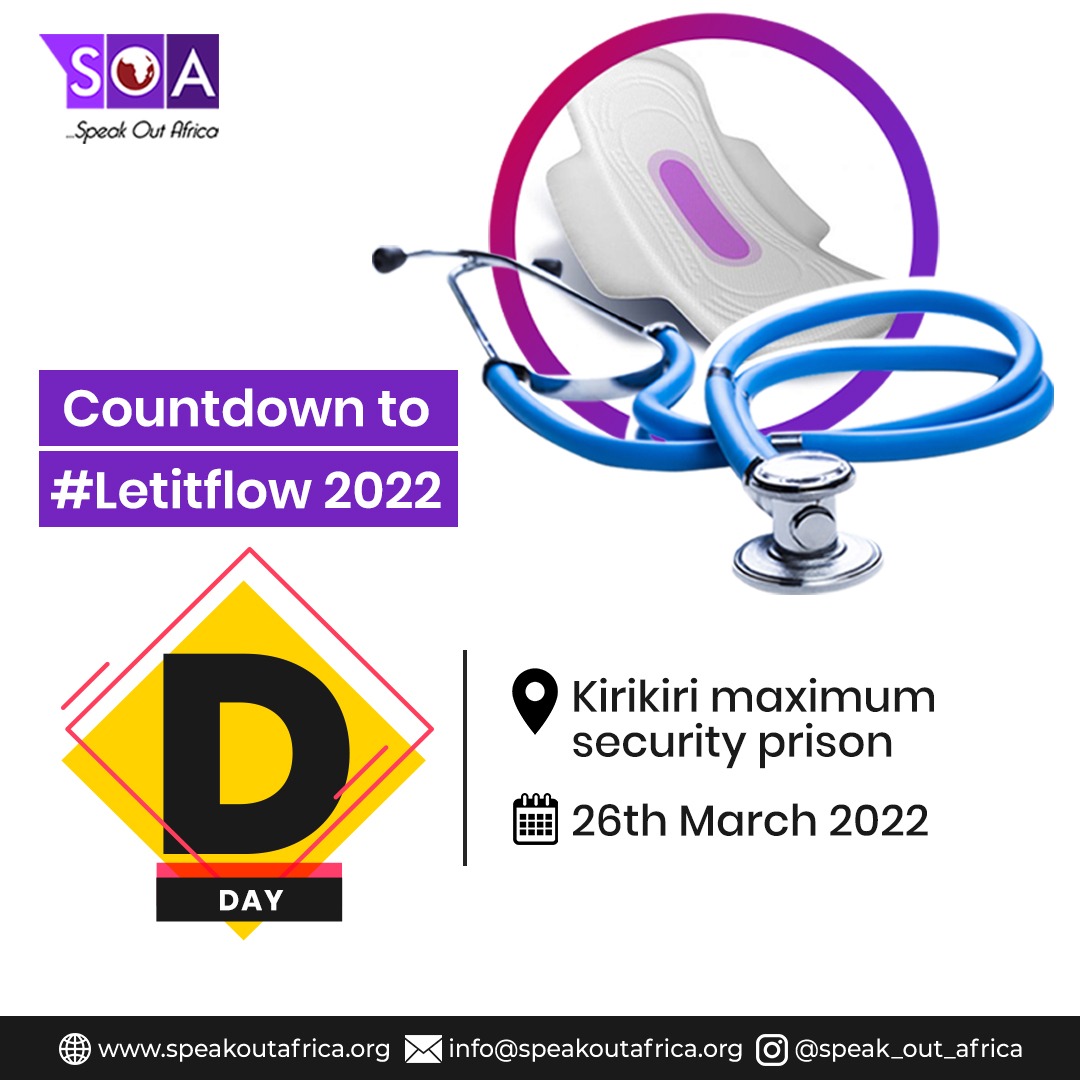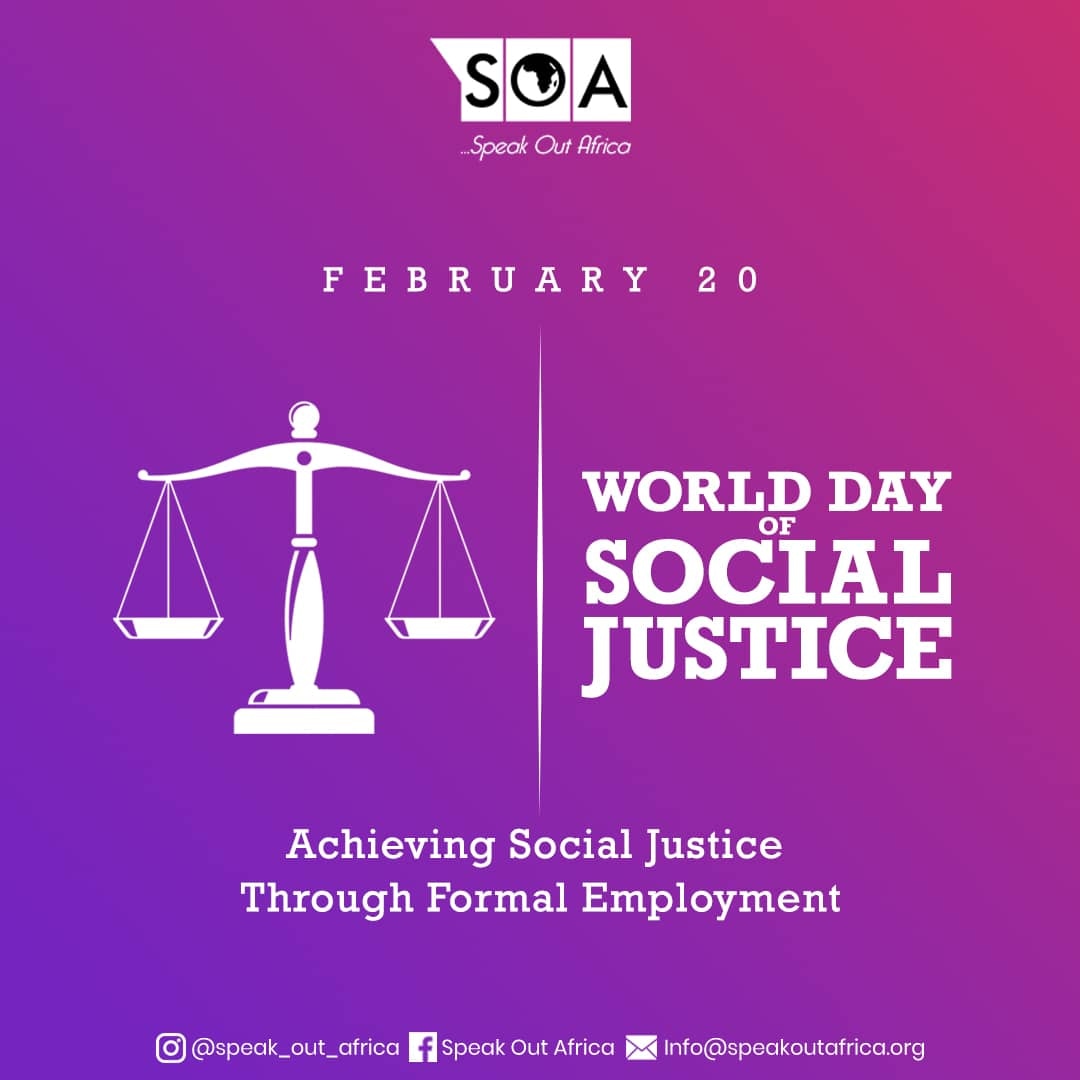By Ruth Soronnadi
Nelson Mandela, a global human rights defender, ex-President of South Africa and a former prisoner rightly said:
“It is said that no one truly knows a nation until one has been inside the jails. A nation should not be judged by how it treats its highest citizens, but its lowest ones.”
The issue of prisoners’ rights is one that is steadily gaining attention and global support. While it is presumed and other times proven as in the case of convicts that prisoners have violated the rights of others or broken the law of the society, in line with the tenets of democracy, provisions are still made for their protection. Prisoners are first and foremost human beings and retain all rights which citizens in general have except those that must be limited or forfeited for the purpose of administration in a correctional institution. Prisoners/detainees are usually locked away from public scrutiny, dependent on the prison administration for their daily sustenance which makes them vulnerable and easily subject to maltreatment hence the need for their protection. The goal of prison/correctional systems in Nigeria and beyond should be to not just dissuade inmates from criminal pursuits but serve as a means to reform and rehabilitate them to be better citizens while in incarceration and after their release.
The 1999 Constitution of the Federal Republic of Nigeria (as amended) under Chapter IV Section 34 recognized the rights of prisoners not to be subjected to torture, inhuman or degrading treatment.
Article 10 of The International Covenant on Civil and Political Rights provides that all persons deprived of their liberty shall be treated with humanity and with respect for the inherent dignity of the human persons.
Article 5 of the African Charter on Human and Peoples’ Rights provides that all person deprived of their liberty shall be treated with respect for the inherent dignity of the human person.
Equally Principle 1 of the Basic Principles for the Treatment of Prisoners provides that all prisoners shall be treated with respect due to their inherent dignity and value as human beings amongst other local and international legislations.
On the 31st of July 2019, Nigeria enacted the Nigerian Correctional Service (NCS) Act 2019 (The Act) and with that repealed the Prisons Act, 2004. The erstwhile Prisons Act that had been in force since 1972 was very outdated and not in conformity with international best practices. Notable amongst its flaws is the fact that it had no clear discernible objectives and was completely silent on the issue of reformation/rehabilitation which is the thrust of modern penal policy. It was structurally inadequate and scantily addressed issued relating to welfare of inmates. Above all, the repealed law did not contemplate non-custodial sentencing options such as parole, probation, community services and suspended sentence which is presently provided by the Administration of Criminal Justice Act , 2015 (ACJA).
The NCS Act made some notable innovations; firstly it changed the name of prisons to correctional facilities with a clear objective to promote rehabilitation and integration of inmates and providing custodial and non custodial services. It equally provided for the rehabilitation and reformation of juvenile offenders and the establishment of borstal training institutions in all states of the Federation. Furthermore, it made attempts to address some plights of female inmates one of which is the joint incarceration of male and female inmates in the same facility thereby exposing them to vices including sexual harassments and abuse from the males. Section 34(1) of the Act mandated the provision of separate facilities for female inmates in all the states of the federation. Section 34(2) goes further to address special, medical and nutritional needs of the female inmates including pregnant women, nursing mothers and babies in custody. The Act also mandates the provision of crèche in every female custodial center, conducting pregnancy and DNA analysis, offering prenatal and antenatal health care as well as sanitary provisions for female inmates.
In addition, the Act made provisions with respect to the establishment of institutional, systematic and sustainable mechanisms to address the high number of persons awaiting trial and ensure speedy disposal of sure cases. It made attempts to address overcrowding as it put in place measures for monitoring and reporting overcrowding of custodial centers. Section 12(4) mandates the State Controller to notify the Chief Judge of the State, the Attorney General of the State; Prerogative of Mercy Committee, State Criminal Justice Committee and other relevant body within a period not exceeding one week in a situation where a custodial center has exceeded its facility. As a precautionary measure against overcrowding in custodial centers, the Act provides for the power of the State Controller of Correctional Service and Superintendent to reject intake of inmates where it is apparent that the Correctional Center is filled to capacity and provides sanction for non compliance.
Furthermore, the Act provides mandatory educational and vocational skill training programmes, modern farming techniques and animal husbandry for inmates in every facility. Expressing zero tolerance for torture, inhuman and degrading treatment, sexual and non-sexual violence and bullying against inmates, the Act makes the Correctional Service to take steps to prevent these vices. It prohibits inmate’s slavery or servitude. It prohibits inmates from carrying out labor of afflictive nature or for the personal benefit of ant correctional officer. More so, as an improvement on the repealed Act, the Act mandates the Correctional Service to put in place health care services that promotes, protects the physical as well as the mental health of inmates, prevent and treats diseases. To this effect, the Correctional Service is mandated to establish a health care center and deploy at least one medical doctor in all custodial centers.
Finally on innovations for the purpose of this discourse, in line with the ACJA 2015, the Act provides non custodial measures such as: probation, parole, community service, restorative justice measures and other non-custodial measures applied by a court of competent jurisdiction. It also provides mechanisms for monitoring and supervising these measures. Section 43 of the Act requires the Controller-General to provide a platform for restorative justice measures which includes: victim-offender mediation; family group conferencing, community mediation and any other mediation activity involving victim, offenders and community representatives (where applicable).
Despite these and other laudable innovations of the Act, in Nigeria the conditions of our prison/correctional services are still deplorable, inhuman, fall short of international standards particularly the United Nations Standard Minimum Rules for Treatment of Prisoners (The Mandela Rules). Our current correctional facilities are very over crowded, archaic and dilapidated.
While the Act in Section 12(8) empowers the State Controller of Correctional Service in conjunction with the Correctional Center Superintendent to reject intakes of convicts where the capacity of the Correctional center has been exceeded, there is no provision for where the rejects will be taken to. The feasibility of implementing that provision is questioned in the absence of new structures that complies with the provisions of the Act. In 2021, the Controller General of NCS in defending the budget allocation for prisons stated that there are about 66, 340 inmates in Nigerian correctional facilities and out of these 47,559 are awaiting trial.
On the issue of female prisoners, till date Nigeria can boast of only two independent female prison- Kirikiri Maximum Prison in Lagos and Numan Old Prison in Adamawa. All other female prisons are carved out of male prisons. Nigerian female prisoners are confined in make-shifts grossly inadequate accommodations. Research has revealed that about 95 percent of Nigerian prisoners come within the child bearing age bracket and are subjected by nature to monthly menstruation. The stories of how they manage the flow are really pathetic. Some resort to old rags, others pieces of paper while some others sit on the floor scantily dressed allowing the blood to be absorbed between the floor and the dress. They will then be compelled to walk about with period stains on their dress and sit on the bare and dirty floor in order to control the flow between their legs. The tissue paper brought by some visitors to the prison is barely enough for two days of the four to five day period flow. This results in their exposure to various types of infectious disease. Apart from its effect on their physical health, their mental health is equally affected. This same situation applies to pregnant inmates who are brought back to the prisons after having their babies in hospitals outside. It is the duty of Nigerian Correctional Service to provide female prisoners with the necessary articles to keep themselves clean. Rule 15 of the Mandela Rules provides that prisoners shall be required to keep their persons clean and to this end they shall be provided with water and with such toilet articles as are necessary for health and cleanliness.
Equally, while Section 34(4) of the Act provides for prosecution of an officer who impregnates a female inmate, the long standing issue of sexual assault and rape of female inmates in custodial centers was sidestepped. Female inmates are usually victims of sexual abuse and humiliation by law enforcement agents, prison officials and their male counterparts. Such abuses include but not limited to verbal abuse, improper touching during pat-down searches, frequent and unnecessary searching and spying on prisoners during showers and in living areas, rape which could be in form of forcing female inmates to render some form of sexual services in exchange for access to goods and privileges to enjoy basic human rights.
With respect to minors/child offenders even after the Act, there are still only 3 Borstal Training Institutions in Nigeria which are located in Barnawa Kaduna State, Ganmo Kwara State and Abeokuta Ogun State which are grossly inadequate and overcrowded. Some places like Minna, Markurdi, Port Harcourt, Akwa Ibom, Ebonyi have remand homes/juvenile delinquency centers which are substandard and poorly managed, other States like Anambra do not have any facility for juvenile delinquents. This has resulted in the ugly practice of sending juvenile delinquents to adult correctional centers. Even with the provision of the NCS Act that empowers the Superintendent to reject juvenile offenders, the question yet to be answered in line with the increase in crimes perpetrated by some minors, where would they be sent to? This has resulted overtime to falsification of ages of minors even when by all physical indications they are below 18 in order to remand them in prison.
Children who are in conflict with the law should not be dealt with as criminals because they are supposed to be in a place where they will realize their mistakes and are taken through the process of rehabilitation. During the Commemoration of the 2019 African Pre-trial Day themed: Decriminalization of Petty and Minor Offences, the Anambra State Human Rights Commission Coordinator Mrs Flaura Ugwuanyi made a saddening observation that up to 523 children were in Anambra State prison made for adults only. Equally the provision of Section 34(6) of the Act on the withdrawal of a child less than 2 years from an incarcerated mother has been argued to not be in the best interest of the child. There is a need to make alternative provisions for these children considering their best interest and individual circumstances before withdrawing them from their mother.
The laudable provision of the Act on the application of non custodial sentencing which will go a long way to reduce the number of inmates in our prison, and in line with international best practices on rehabilitation of prisoners is still an article of faith in Nigeria. The courts are yet to award such sentences. Amongst other reasons the poor attitude of record keeping and tracing of prisoners who abscond, poor systems of monitoring and evaluation contributes to this lethargy by the courts to implement this.
The state of correctional services presently in Nigeria and the adverse effect on rights of prisoners- male, female, juveniles is one that needs to be looked into as a matter of urgency. It is recommended that more correctional facilities should be built to augment the existing ones with standard living conditions, educational, health and vocational structures and the old ones renovated. Equally, states should be given the opportunity to establish correctional centers and run its affairs through a decentralization of the prison system. However, this will entail a constitutional amendment as prisons fall under the exclusive legislative list therefore under federal government’s jurisdiction.
In conclusion, while there is also a need for judicial activism on the implementation of non custodial sentencing in line with international best practices and administration of criminal justice, there is also a need to investigate the appropriation of funds allocated for prisons in Nigeria. In two years despite the allocation of 165 billion naira for correctional facilities by the national assembly, no new structures have been put in place in line with the provisions of the Act, existing correctional facilities are still in very deplorable conditions and the general welfare of inmates below international standards.

Ruth Soronnadi is a Lawyer, Chartered Mediator, YALI Fellow and Administrator. She has an LLM with Distinction in International Law and Human Rights. She is interested in public speaking & advocacy, policy making and analysis, strategic planning, human resource management for the government and international organizations.





Raymond Chris
What a captivating piece full of Compassion and desire for change! I’ve never visited a prison facility but reading this article has given me so much insight on what’s really happening behind those sad high Walls . I pray this issues are looked into and the appropriate measures applied as recommended.
God bless you Ruth.
Agu Blossom
This is a laudable piece, very insightful and expository. This is a clarion call for government to awaken to their duties. I never knew there are plenty provisions made for prisoners, yet they are treated less than animals in our country today. The part that caught me is the high and unthinkable number of detainees awaiting trial! It’s unfair!!
Thank you for this revelatory piece, Barr. Ruth!
Obimdi Precious
This is a brilliant piece. Keep the good work up.
Chimzurum Deborah
The realities are so harsh I wouldn’t want even ‘my enemy’ to sleep in any Nigerian prison for whatever reason.
This is so enlightening. Hopefully, Nigeria’s new dawn will rise, soon.
Thanks Barr. Ruth! Looking forward to more of your articles.
U.C. Meziel
I love the fact that somebody is now speaking out about the state of that hell we call correctional center. The Nigeria prisons has a reputation of turning casual offenders into demons
Chukwuma Nzubechukwu
Amazing truth been spoken out here. Stand up, speak out, for prisoners’ right in Nigeria!!
Dignity for every humanity is a necessity. Beautiful work Barr Ruth.
Uche Stephy
Wow, I never knew there were such provisions for inmates in Nigeria, I definitely learnt a lot. However, the sad truth is that the state of “correctional facilities” in Nigeria is very poor and the development of capacity to execute most of the newly enacted laws is next to zero. Thank you Barr. Ruth for this eye-opening piece.
chinedu ogbughalu
This is an eye opener for me,have never given thought to those silent points you listed out. I wish the global world can see this….. Is wish this article be published in our national journals and news papers…..
Amarachi Aniagu
Wow!! This was such an insightful and informative read. Thank you for sharing, Barr. Ruth.
Ozioma Mercy
Every human deserve to be treated with dignity whether bound or free.
The government need to step up in her responsibilities and do the needful.
Thank you for this enlightening article.
Good job, well done!
Nwangwu Marae
Thank you for speaking up on this issue. This is a very enlightening piece.
Ezeokonkwo Chisom
It’s important we now start seeing the prison as a correctional facility, not just a holding site. Correction goes beyond punishment and to have our streets filled with really corrected ex-convicts etc, then the institution must be looked into.
Thank you for this piece.
Nnadozie Praise
Wow! This is an insightful and enlightening piece, hopefully the government would wake up and do better.
Keep up the good work
Kingsley
Wonderful piece. Though the new act is laudable, much efforts should be put in implememtation as you also noted. It is good that young people like you are speaking out
Sandra
This is a thought provoking and enlightening piece. N165 billion allocation for correctional facilities, yet… 😕This is sad. I felt so much compassion for the inmates. Thank you so much for this article, Ruthy. I will definitely share.